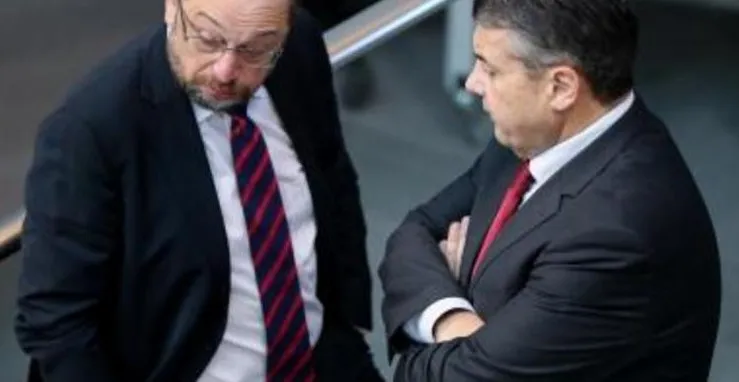
Berlin (dpa) - Shortly before the end of the negotiations on a renewed grand coalition, the SPD has fallen in the new ARD "Germany trend" to 18 percent - the worst ever measured value.
In the party fear the Jusos an accelerated crash and loss of profile, if you should elect for the third time since 2005 CDU leader Angela Merkel Chancellor.
In several states, the right-wing populist AfD has already pushed before the former People's Party. SPD leader Martin Schulz slips in the new "Germany trend" after its rolling course in recent weeks on its worst value in this survey
- he loses five points and lands only with 25 percent approval.
Overshadowed by the fragile state of the oldest party in Germany, which fits into the crisis of social democracy across Europe, the Union and the SPD reached further agreements on the night of Friday. The planned coalition of CDU, CSU and SPD wants to change the Basic Law so that the federal government can participate more in the expansion of all-day schools and a digital pact for schools. For this purpose, the Paragraph 104c of the Basic Law should be changed, said the negotiators in Berlin.
So far, federal financial assistance is only permitted for financially weak municipalities. For the planned amendment of the Basic Law, a two-thirds majority in the Bundestag is necessary - which a large coalition would not have. The Prime Minister of Mecklenburg-Western Pomerania, Manuela Schwesig (SPD), emphasized that the education, digital and research package totaled a volume of six billion euros. Two billion euros of this should be made available for the expansion of all-day schools and for the care, in addition, a legal right to full-time care of elementary school students will be introduced. One billion should be there for a student loan reform. The agreement on the "lighthouse project education" could also be an important argument to convince the SPD base in the membership decision to agree to the coalition.
The parliamentary managing director of the CSU deputies in the Bundestag, Stefan Mueller, said, one would also introduce a fee-free also for the master students. "Bund and country, hand in hand," is the new motto, said the SPD politician Hubertus Heil. So far, education is almost exclusively a matter for the state, so far the so-called cooperation ban prohibits the federal government from co-financing education. The theme should become the "flagship" of the coalition, Heil. Previously, a billion-dollar pension package had been arranged.
Unlike the SPD, the Union does not hinder the difficult formation of a government by the German trend. It comes as in early January to 33 percent. The AfD would come to 14 percent (plus 1), the FDP to 10 percent (plus 1), the left to 11 percent (plus 2) and the Greens to 11 percent (unchanged). In a Forsa survey, the SPD in January had even come to only 17 percent.
The downward trend continues for the new ZDF "Politbarometer": the Social Democrats are slumping by one percentage point to 19 percent. But the Union also loses its consent. If next Sunday would be federal election, CDU and CSU would come here only to 31 percent - a minus of two points, as the ZDF announced on Friday. By contrast, AfD and the Greens (each 14 percent) are clearly up two points each. The left improves by one point to 11 percent, while the FDP drops one point to seven percent.
SPD leader Martin Schulz receives in the ZDF "Politbarometer" list of the ten most important politicians the hitherto worst rating and thus comes on the penultimate place - in front of CSU boss Horst Seehofer as the tailor. Chancellor Angela Merkel (CDU) takes third place - behind Bundestag President Wolfgang Schäuble (CDU) and SPD Foreign Minister Sigmar Gabriel.
In the SPD, a coalition with the CDU / CSU according to the survey is still controversial. However, 59 percent of SPD supporters pleaded for a government with the Union - significantly more than in January (47 percent). 39 percent (January: 51 percent) thought it would be better for the party to take over the opposition role.
With the first meeting of more than 90 negotiators, the Union and SPD start the hot phase of the negotiations on Friday afternoon. All 18 working groups will also be presenting their results in the SPD headquarters for about 20 minutes each. CSU General Secretary Andreas Scheuer criticized that the AG's had submitted "10 pages plus" - the stated goal is to present a leaner contract than the approximately 180 pages last time. But there is a willingness to get involved on all sides - whether beyond the previously planned end on Sunday has to be negotiated, is not yet determined. An extension until Tuesday is considered possible in participant circles.
Before the Social Democrats join a new federal government, the SPD members still have to vote on the coalition agreement. Juso boss and GroKo opponent Kevin Kühnert is confident that the base is still tilting. "At the moment, I'm optimistic that the majority of SPD members will say no to the upcoming vote because even senior executives think the race is open," he told the Rheinische Post (Friday). Otherwise, Germany will again get "a government of the lowest common denominator and the cheapest compromise".
But even in the CDU is growing criticism of the orientation of their own party. People expected "more than a pun on a country in which we live well and happy," wrote Thuringian CDU leader Mike Mohring in a "Focus" guest post. "People want to know what image of Germany their politicians have: in ten, in 20, in 30 years. As a society, as a state, as a nation ».
The GroKo Cabinet and the Schulz dilemma
Source Link:hildesheimer-allgemeine.de